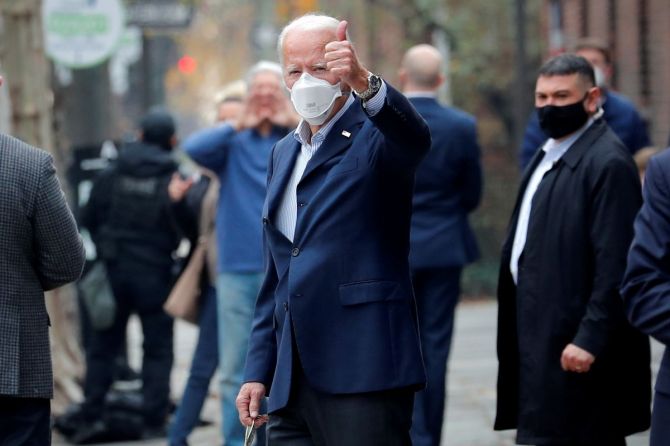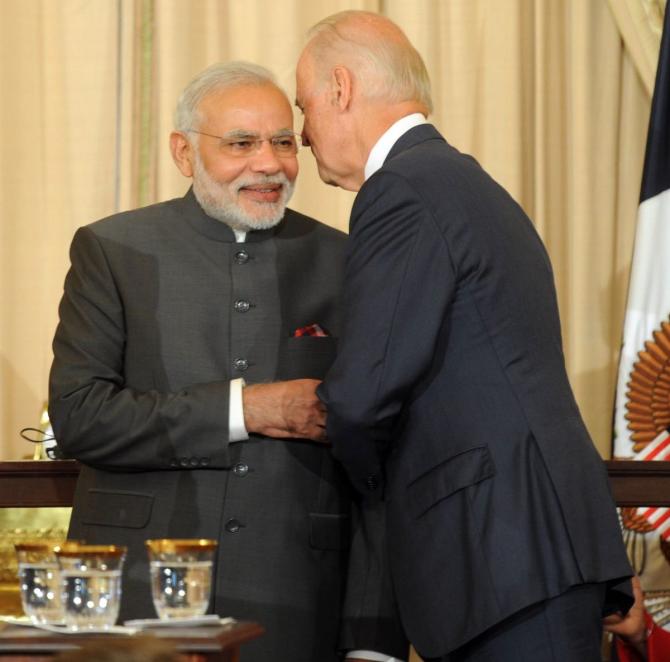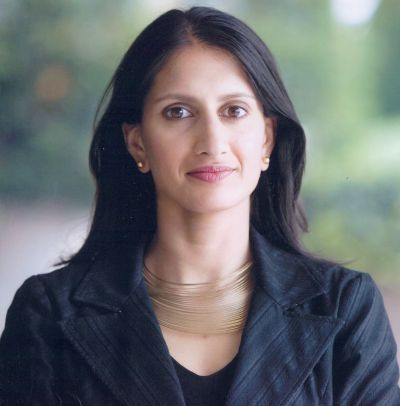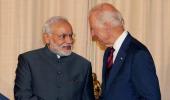'I hope that the incoming Biden-Harris administration works with India to address some of the most profound geopolitical transboundary challenges.'

"India -- if it seeks to be a well-respected and valued democracy on the global stage in the coming years -- must retreat from authoritarian notions of populism and religious nationalism (predicated on the repression of minority groups); end extreme poverty; and work to elevate women's voices and combat alarming rates of gender-based violence," says Sohini Chatterjee, adjunct associate professor of International and Public Affairs at Columbia University.
Professor Chatterjee previously served as a senior policy advisor in the administration of President Barack Obama and has advised numerous foundations, governments, and think tanks on foreign policy and national security issues.
The professor speaks fluent Bengali and moved to America aged 2. The daughter of the first Indian American to be awarded the Padma Bhushan, Swadesh Chatterjee, she holds a law degree from Duke University, a master's degree in international relations and international economics from the School of Advanced International Studies at Johns Hopkins University, and a BA from Columbia University.
Professor Chatterjee discusses what to expect from the Indo-US relations under the Biden-Harris administration with Rediff.com's Archana Masih in an emailed interview.
You recently wrote a Foreign Policy article that Washington's international policy should now put social inclusion at its centre -- what are some of the policies that the US needs to develop in pursuance of this goal in the context of India?
Yes, the article posits that social inclusion is critical not only in terms of personnel, but in terms of US foreign policy content.
We suggest the establishment of a Gender Equality Task Force at the National Security Council as well as the establishment of a cross-sectoral fund to address gender-based violence and gender equity.
India should also commit sincerely and immediately to elevating women in its decision-making and ensuring that women and minorities are integrated both into its senior-level government offices and into its domestic and foreign policies.
Combating gender-based violence and elevating women's rights should become a feature of modern India; sidelining and stifling India's women and girls is not only an unacceptable violation of human rights, it also significantly depresses India's economic growth potential and fundamentally taints its global reputation as a modern and enlightened democracy.
India should champion the rights of minority communities and begin to promote diversity and pluralism over the course of the next decade.
Recently, India has been backsliding into a country that stifles free speech, rather than promotes it. A true democracy must champion core democratic values, including free expression and pluralism.
India -- if it seeks to be a well-respected and valued democracy on the global stage in the coming years -- must retreat from authoritarian notions of populism and religious nationalism (predicated on the repression of minority groups); end extreme poverty; and work to elevate women's voices and combat alarming rates of gender-based violence.
It should take on social and religious inclusion in a committed way and work towards elevating those issues in the multilateral space.
As senior policy advisor in the Obama administration, what would you say were some issues from that time that were discontinued or not given the desired thrust under the Trump administration in America's relationship with India?
Is the Biden administration likely to pick up some of those unfinished agendas and carry them forward?
I hope that the incoming Biden-Harris administration works with India to address some of the most profound geopolitical transboundary challenges.
Issues such as global climate change; human rights; extreme poverty; and Asia-Pacific regional trade cooperation are among the issues that warrant the most immediate attention.
India and the US should also be leaders - individually and jointly -- on democratic norms and principles.
Recently, in both countries, dangerous notions of populism and nationalism have damaged the reputation of both countries on the world stage.
It is high time that both India and the US stand up for democratic norms and core democratic values both at home and abroad.
Indo-US relations have strengthened over the years ever since President Clinton's visit to India in 2000.
Under President Trump, India-US defence relations in particular became stronger.
What would be some of the elements of continuity from the TrumpaAdministration that will be followed by the new Administration?
The Biden administration will, I hope, continue to work closely with India on defence relations and ideally, would enhance cooperation on burgeoning geopolitical threats such as countering violent extremism.
Targeted strategic dialogues around critical defence issues, including transnational organied crime, cybersecurity, disinformation, and violent extremism, should be integrated into US-India defence cooperation.

How different will the tone, tenor, dimension and complexion of the relationship be under President Biden as compared to President Trump?
President Trump has been largely transactional and short-term in his foreign policy. His agenda tends to be very reactionary and as a result, Trump's foreign policy was usually unpredictable and often incoherent.
President-elect Biden has a long-standing history working with India as both Senator and VP. He will also have an exceptionally experienced team with deep foreign policy expertise.
The relationship will reflect that: I suspect it will be more strategic, coherent, and sustainable. It will be predicated on and responsive to an understanding of key geopolitical threats, both short-term and long-term.
President Trump's lack of experience as a statesman and his disdain for diplomacy often resulted in a chaotic Presidency and non-linear bilateral relationships.
President-elect Biden will, I believe, craft more cohesive bilateral strategic relationships and also restore the reputation of the US as a trusted ally and leader on the global stage.
President Obama had cautioned about religious intolerance in his Siri Fort stadium speech just before departing from India in 2015.
What do you think will be the outlook of the Biden presidency towards issues like pluralism, human rights and democratic freedoms?
In my opinion, the religious intolerance that has emerged in India is anti-democratic and fundamentally dangerous.
Pluralism, human rights and democratic freedoms are critical for democracies; as authoritarianism gains strength in various contexts around the world, India and the US must serve as the true beacons of democracy to illustrate the immense opportunities it can provide (for all people).
I hope that President Biden will elevate the importance of pluralism, human rights and democratic freedoms at this critical time (when democratic backsliding is so prominent) and that India will understand that religious intolerance has no place in a democracy.
I also hope that both countries will elevate human rights, pluralism and democratic principles at the UN and in the multilateral community.

How do you reckon Washington and New Delhi will work together to counter China?
The US and India should focus on enhancing trade cooperation in the Asia-Pacific to counter China's rising influence in the region. The Trans-Pacific Partnership was an important attempt to bring key regional actors together and ensure that China's economic dominance in the region was tempered.
At this point, there are still really a multiplicity of ways that the US and India can and should work together on economic and trade cooperation; their joint and individual leadership in the Asia-Pacific region could alter the dynamics in a profound manner over the next decade.
More importantly, perhaps, enhanced trade cooperation could significantly boost economic growth in both countries at a critical time (following the economic hardship caused by COVID-19)
Could you tell me about your personal relationship with India? How often do you visit etc, and what enhanced role do you see for India Americans in the new administration? How will Indian Americans shape the Biden administration?
I was born in India, but moved to the US at age 2. I used to visit India each and every year and remain close to my family in West Bengal.
In some ways, I grew up between two very different worlds -- with my traditional Bengali extended family in India and my more modern immediate family in the US.
I speak fluent Bengali and my parents made sure that India was an integral part of my identity. I grew up singing Tagore songs with my mother and worked -- at an early age -- alongside Mother Teresa in Kolkata before her death.
My experiences in India led me to want to work in foreign policy and global development. Indian-Americans have been a vibrant, devoted, and active community in US politics for a long time. [I know this first-hand, as my father was the first-ever Indian American to receive the Padma Bhushan for Public Affairs.]
Between President-elect Biden's experience working with the Indian American community for decades and the vice president-elect's cultural background, I suspect that the IndianAmerican community has many, many reasons to be proud of its contributions to date and work in and with the incoming administration to address the immense challenges of the future.
Feature Presentation: Aslam Hunani/Rediff.com











 © 2025
© 2025